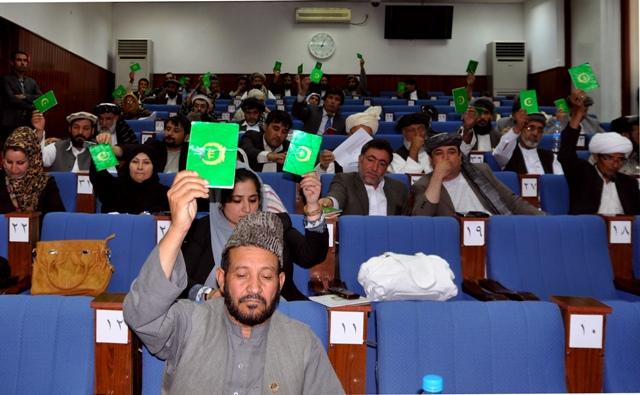KABUL, or upper house of parliament, on Tuesday upheld a presidential decree reserving a parliament seat for the Hindu and Sikh minority.
On Dec. 14, the Wolesi Jirga rejected the legislative decree President Hamid Karzai had signed in early September in line with Article 79 of the constitution and the electoral law.
The article says: “During the recess of the House of Representatives, the government shall, in case of an immediate need, issue legislative decrees, except in matters related to budget and financial affairs…”
Legislative decrees, after their endorsement by the president, have to be presented to the National Assembly within 30 days of its first session. If rejected by the National Assembly, they become void.
But the lower house spurned the measure as illegal. Thirteen of the 18 permanent house panels opposed the decree as a step in conflict with Articles 22 and 83 of the constitution.
Article 22 prohibits any kind of discrimination and privilege between the citizens of Afghanistan. All citizens — whether man or woman — have equal rights and duties before the law.
Similarly, Article 83 says members of the Wolesi Jirga are elected by the people through free, general, secret and direct elections. The election shall be held within 30 to 60 days before the expiry of the term of the Wolesi Jirga.
Mohiuddin Munsif, the Senate Legislative Commission chief, told lawmakers that a Wolesi Jirga seat be reserved for Hindus and Sikhs and Afghanistan be declared an electoral constituency for the minority.
It was necessary because Hindus and Sikhs living in different parts of the country could not win the required number of votes from one province, he argues.
Asked for their opinion, 49 of the 56 members present voted for the presidential orders — forcing the creation of a joint parliamentary commission to reconcile differences between the two houses.
Article 100 of the constitution says if one house rejects a decision of the other, a joint commission comprised of an equal number of members from each house shall be formed to resolve the difference.
The decision of the commission, after endorsement by the president, shall be enforced. If the joint panel does not solve the differences, the decision shall be considered rejected.
In such situation, the Wolesi Jirga has to pass it with two-thirds majority in its next session. This decision, without submission to the Senate, shall be promulgated once endorsed by the president.
On July 31, the Council of Hindus and Sikhs in Afghanistan had warned of leaving the country if they were not given proper representation in the lower house of the parliament.
Flanked by civil society representatives, Rail Singh, the council’s deputy head, had asked the government to take effective measures to address the problems being faced by the minorities.
In the original draft election law, a seat had been reserved for the Hindus and Sikh, he told a news conference. But the parliament deleted the clause, he regretted.
“We are very much concerned about the abolition of the reserved seat,” remarked Singh, whose community has no representation in parliament. No parliamentarian bothered to discuss the problems being faced by the minority, he deplored.
mud
Visits: 4









GET IN TOUCH
NEWSLETTER
SUGGEST A STORY
PAJHWOK MOBILE APP